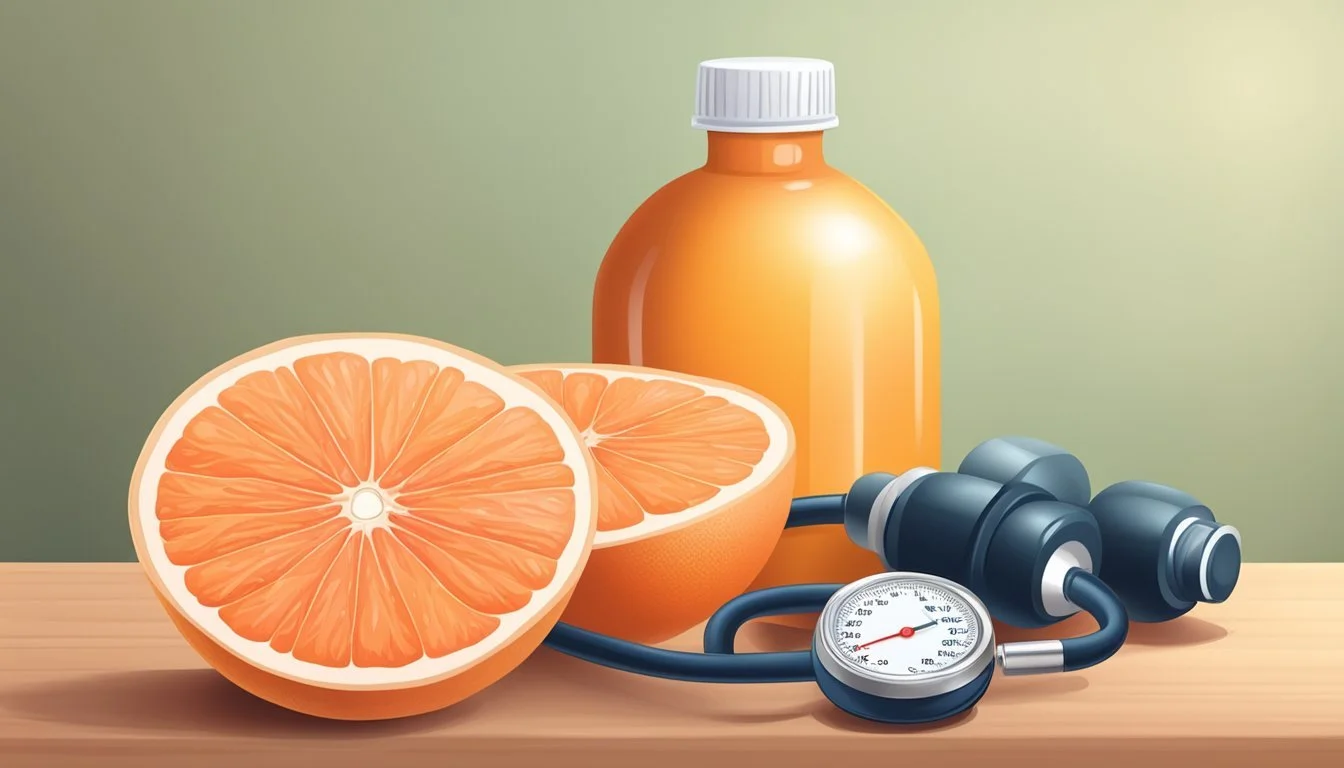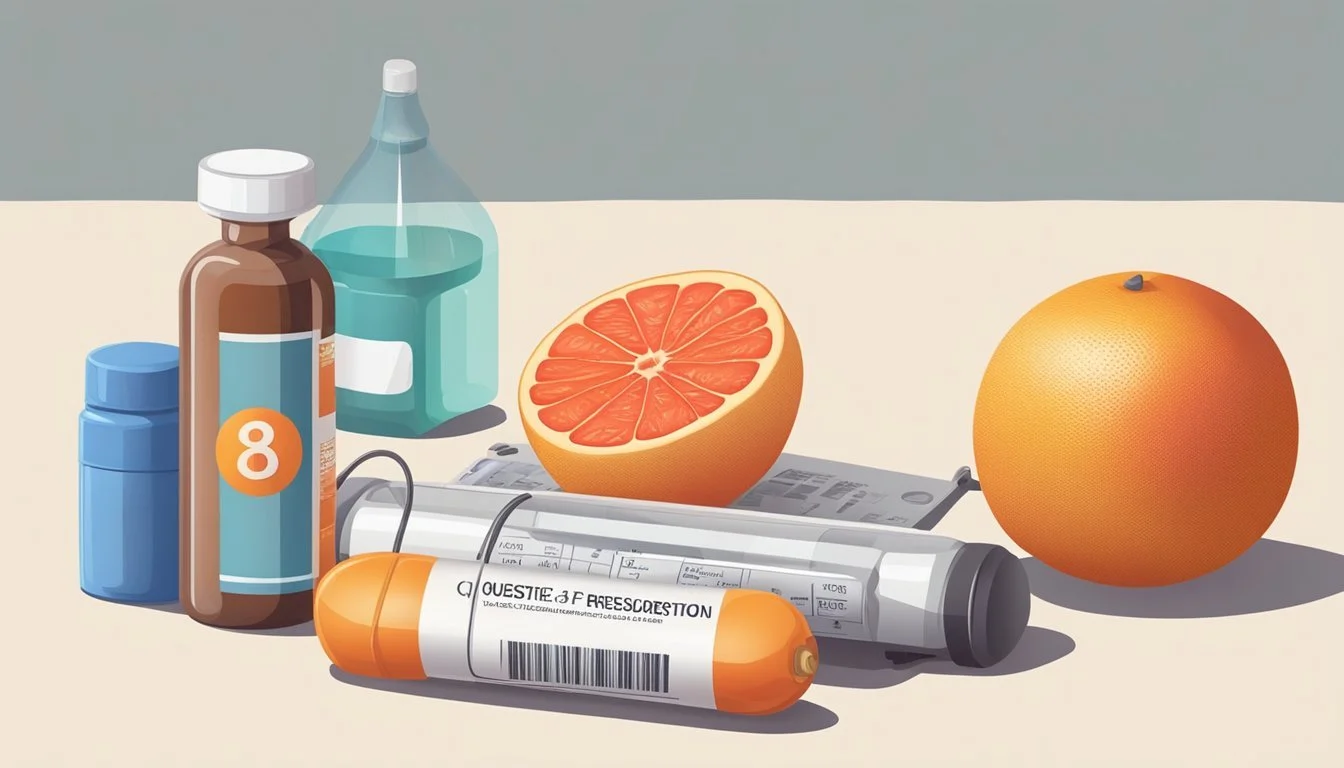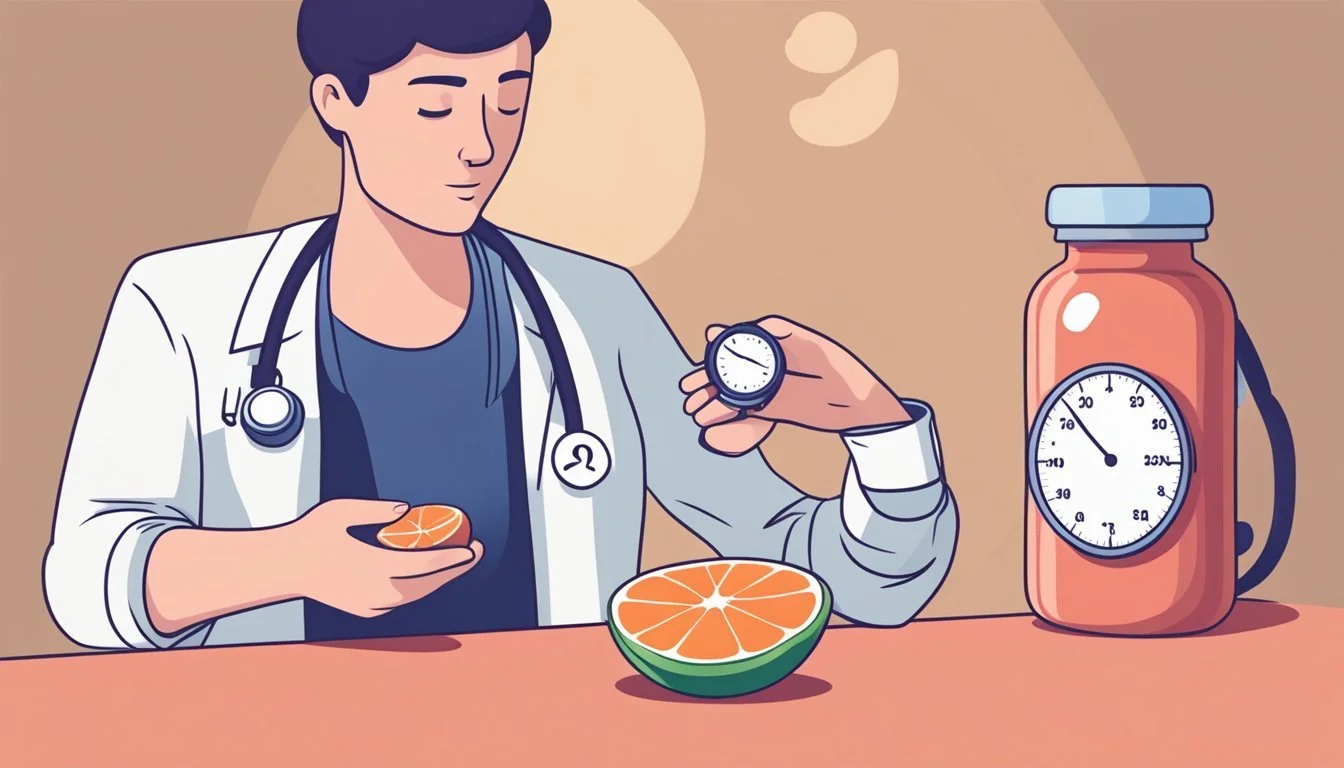Is It Okay to Eat Grapefruit with Blood Pressure Medications?
Understanding the Risks
Grapefruit is commonly known for its rich vitamin content and health benefits; however, it can pose risks when consumed alongside certain medications, particularly some blood pressure drugs. The fruit contains compounds that interfere with an enzyme in the digestive system, which ordinarily helps to break down these medications. This interference can lead to excessive levels of the drug in the bloodstream, potentially causing adverse effects.
For individuals on blood pressure medications, it's important to be aware of this interaction. Certain blood pressure medications are metabolized by the body using the enzyme CYP3A4. Grapefruit, as well as grapefruit juice, can inhibit the function of this enzyme and affect how drugs are absorbed and processed by the body. This can lead not only to unwanted side effects but may also impact the efficacy of the medication itself.
Given the seriousness of managing blood pressure effectively, patients are advised to consult their healthcare provider regarding their diet, particularly concerning grapefruit consumption. While some blood pressure medications may have a known negative interaction with grapefruit, others might not. Therefore, personal medical advice from a healthcare professional is crucial in order to avoid any potential complications.
Grapefruit and Medication Interactions
Grapefruit can significantly impact the effectiveness and safety of certain blood pressure medications. This section clearly explains the interaction mechanism, specifies which medications are affected, outlines the associated health risks, suggests alternatives to grapefruit, and discusses the pertinent legislative recommendations.
Understanding the Mechanism
Grapefruit contains compounds that inhibit an enzyme in the liver known as cytochrome P450 3A4 (CYP3A4). This enzyme is crucial for the metabolic breakdown of many drugs, including certain blood pressure medications. When grapefruit juice is consumed, the normal function of CYP3A4 is disrupted, leading to higher concentrations of the drug in the bloodstream.
Common Medications Affected by Grapefruit
Calcium Channel Blockers (CCBs): Medications such as nifedipine, felodipine, and others are commonly prescribed to manage high blood pressure. They are known to interact with grapefruit, potentially leading to dangerously low blood pressure levels.
Statins: Drugs like atorvastatin and simvastatin, used to lower cholesterol, can also interact with grapefruit, increasing the risk of side effects.
Possible Health Risks
The interaction between grapefruit and some blood pressure medications can lead to serious side effects. These may include:
Rhabdomyolysis: A condition that leads to muscle breakdown and potential kidney damage.
Abnormal Heart Rhythms: Particularly with medications like CCBs when taken with grapefruit or grapefruit juice.
Alternatives and Substitutes for Grapefruit
Patients taking blood pressure medications who enjoy citrus fruits can opt for alternatives less likely to interact with their medication. These include oranges and tangelos. It is important, however, for individuals to consult with healthcare providers before making dietary changes.
Legislation and Recommendations
U.S. Food and Drug Administration (FDA): They require warnings on certain medication labels about the potential grapefruit interaction.
American Heart Association (AHA) and Mayo Clinic: These organizations provide guidelines advising patients to avoid grapefruit when taking affected medications.
Blood Pressure Medications Explained
Managing hypertension often involves the careful selection and use of blood pressure medications, which can have varying mechanisms of action and are produced under different brand names.
Types and Common Brands
Blood pressure medications come in various types, each targeting a specific aspect of blood pressure regulation. Calcium channel blockers (CCBs) are a common category that helps relax blood vessels. Brands such as Norvasc (amlodipine), Procardia (nifedipine), and Cardizem (diltiazem) fall into this group. Statins, used to lower cholesterol, which can indirectly affect blood pressure, include brands like Lipitor (atorvastatin), Zocor (simvastatin), Lescol (fluvastatin), and Crestor (rosuvastatin).
How Blood Pressure Drugs Work
Blood pressure drugs can have different actions in the body. Calcium channel blockers like amlodipine (Norvasc) work by preventing calcium from entering cells of the heart and blood vessel walls, leading to lower blood pressure. Statins such as atorvastatin (Lipitor) and rosuvastatin (Crestor) work by inhibiting an enzyme in the liver to reduce the production of cholesterol, which in turn can help prevent the narrowing of arteries.
Lifestyle and Blood Pressure Management
In addition to medication, lifestyle changes play a vital role in managing high blood pressure. They include:
Weight Loss: Reducing weight can lower blood pressure.
Diet: A heart-healthy diet that is low in sodium and rich in fruits and vegetables is recommended.
Exercise: Regular physical activity helps maintain a healthy blood pressure.
It's important for individuals to work closely with their healthcare provider to determine which medication and lifestyle combination is most effective for them.
Managing Medication and Diet
Incorporating fruit like grapefruit into a diet can present complications for those on certain medications, such as blood pressure drugs. It's essential to understand the interplay between food nutrients and medication efficacy.
Nutritional Considerations with Medications
Grapefruit is rich in vitamin C, antioxidants, fiber, and potassium, which contribute to overall health. However, it contains compounds that can alter the way medications are metabolized in the body. Blood pressure medications often interact with grapefruit, potentially leading to unintended side effects or decreased effectiveness. For patients on these medicines, it's crucial to recognize which healthy foods might pose risks when mixed with their prescriptions.
Creating a Safe Diet Plan
Developing a diet plan while on medications for blood pressure management should involve:
Reviewing medication guidelines: Read labels and documentation for any dietary warnings.
Identifying safe foods: Incorporate a variety of fruits and vegetables that don't interact with medications.
Consulting with a health care professional: A doctor or a dietitian can help create a meal plan that considers the medications being taken.
This approach ensures that patients benefit from a healthful diet without compromising their medication regimen.
Consultation and Medical Advice
Patients should always seek medical advice from their health care professional before making dietary changes. Here's how they can approach this:
Prepare questions: Write down any questions or concerns about diet and medication interactions.
Schedule an appointment or email: Engage with a doctor or pharmacist for personalized advice.
Regular check-ups: These allow for ongoing monitoring of the interaction between diet and medication.
By actively consulting health care providers, patients can navigate their dietary choices to support their medication's efficacy and their overall health.
Additional Considerations and Drug Categories
When discussing the consumption of grapefruit alongside blood pressure medications, it is crucial to consider the broader spectrum of drug classes and the specific effects they may have when interacting with grapefruit. Patients need to be aware of the categories of drugs that carry risks and engage in conversations with healthcare professionals to manage these risks effectively.
Interactions with Other Drug Classes
While the focus is often on blood pressure medications, grapefruit can also affect other drug classes, such as certain cholesterol-lowering medications (statins) and erectile dysfunction medicines. Grapefruit has been noted to increase the blood levels of these drugs, potentially leading to side effects.
Cholesterol Medications: Statins like atorvastatin, lovastatin, and simvastatin are known to interact with grapefruit, resulting in increased medication levels and risk of muscle pain.
Erectile Dysfunction Drugs: These can have increased effects and side effects when taken with grapefruit, due to higher drug levels in the bloodstream.
Specific Risks for Certain Populations
Specific populations may be at higher risk for complications from drug interactions with grapefruit. These include individuals who are overweight or have pre-existing conditions such as heart disease or cancer. It is imperative for these patients to consult a doctor or pharmacist before consuming grapefruit if they are on medications that could interact.
Overweight Individuals: They may be on various medications, and grapefruit can interfere with weight management drugs, increasing the likelihood of side effects.
Heart Disease Patients: They often take multiple medications, and the introduction of grapefruit into the diet can alter drug efficacy and safety profiles.
Monitoring and Adjusting Medications
Routine monitoring and medication adjustments by a healthcare professional are key when there is a potential for interactions with grapefruit. This is especially relevant for patients managing allergies, as antihistamines are among the drugs that grapefruit can affect.
Allergy Medications: Healthcare professionals may need to adjust doses for patients who consume grapefruit due to increased concentration of these drugs in the bloodstream, which can cause unintended side effects.
Health Care Professional: Regular consultation with a healthcare provider is necessary to monitor drug levels and mitigate any adverse interactions with grapefruit consumption.
Conclusion
When managing blood pressure with medications, patients should approach grapefruit consumption with caution. Grapefruit and grapefruit juice have the potential to interact with various blood pressure medications, leading to significant health concerns.
Grapefruit Interactions: It inhibits a critical enzyme, CYP3A4, affecting the metabolism of certain drugs.
Medication Efficacy: The interaction may enhance or reduce the effectiveness of blood pressure medications.
Patients are advised to consult their healthcare provider to review their medication regimen and dietary habits. Healthcare professionals possess the expertise to provide guidance tailored to each individual's circumstances.
For those taking blood pressure medication, it might be necessary to:
Avoid grapefruit entirely.
Limit grapefruit intake as per medical advice.
Schedule grapefruit consumption at a different time than medication intake, only if deemed safe by a healthcare provider.
Monitoring is crucial. Patients should stay alert to any adverse symptoms or change in blood pressure and report these to their healthcare provider. They are also encouraged to:
Read medication labels carefully for grapefruit-related warnings.
Request clear instructions about dietary restrictions when starting new medications.
Patients can remain confident in managing their health effectively by maintaining open communication with their healthcare providers and staying informed about potential dietary interactions with their medications.
Resources and Further Reading
For individuals taking blood pressure medication, it is essential to be informed about potential food and drug interactions. Grapefruit and certain medications may not mix well due to chemical interactions that can affect drug efficacy and safety. Those concerned should consult their doctor or a healthcare professional for personalized advice.
FDA Guidelines: The U.S. Food and Drug Administration (FDA) provides comprehensive guidelines on medication and food interactions. Their resources can help one understand how grapefruit affects the metabolism of certain drugs.
Mayo Clinic: As a reputable source in the healthcare field, the Mayo Clinic offers in-depth articles and discussions on the interactions between grapefruit and medications, including those for treating high blood pressure.
For those who prefer detailed medical research articles, peer-reviewed journals such as The Journal of Clinical Hypertension often feature studies relating to blood pressure medications and diet.
To stay updated on health advisories and medication safety, subscribing to FDA news releases or newsletters from health institutions like the Mayo Clinic can be beneficial. Regular discussions with healthcare providers are also advised to receive the most current and tailored medical guidance.
Remember to always read medication labels carefully for warnings about grapefruit or other dietary restrictions and to seek professional medical advice when in doubt.
Frequently Asked Questions
Can one consume grapefruit while on blood pressure medication?
It's important to exercise caution. Grapefruit has compounds that interfere with an enzyme that normally helps metabolize certain blood pressure medications. Consuming grapefruit while taking these medications can lead to either higher levels of the medicine in the bloodstream, which may increase the risk of side effects, or reduced effectiveness of the medication.
What are the potential effects of eating grapefruit with these medications?
The specific interaction between grapefruit and blood pressure medication can cause an increase in drug potency. This might result in lowered blood pressure beyond the desired effect or potentially cause other adverse reactions. Some medications may become less effective due to grapefruit consumption.
Which blood pressure medications are affected by grapefruit?
Many categories of blood pressure medications, particularly calcium channel blockers, are known to interact with grapefruit. However, not all blood pressure medications are affected. Patients are advised to consult with their healthcare provider for personalized advice.
How much grapefruit causes an interaction?
Even a small amount of grapefruit or grapefruit juice has the potential to cause significant interactions. Healthcare providers often recommend avoiding it altogether while on certain blood pressure medications.
Are there alternative foods or juices without these interactions?
Yes, many other fruits and juices do not have the same enzyme-blocking properties as grapefruit. Patients should consider these as alternatives and discuss safe options with their healthcare provider.





